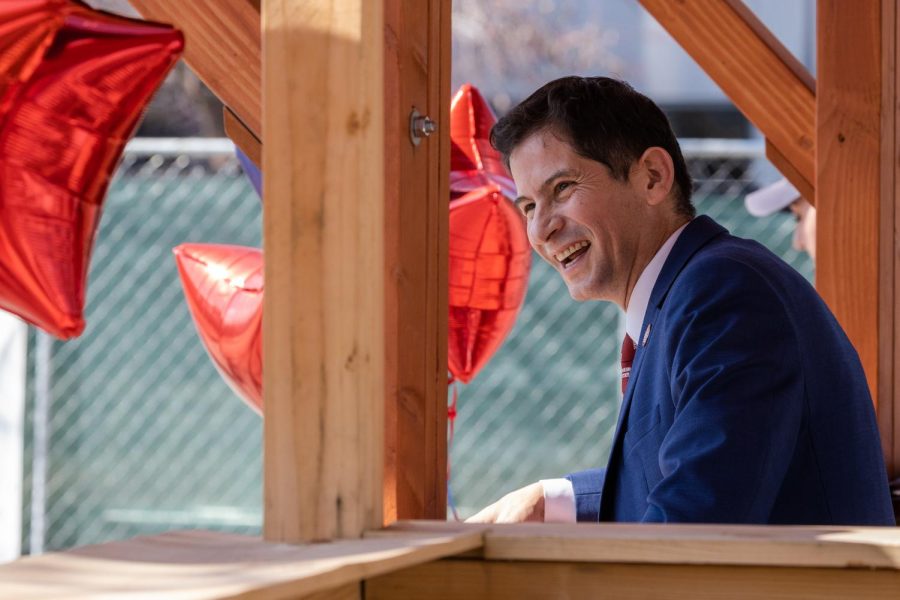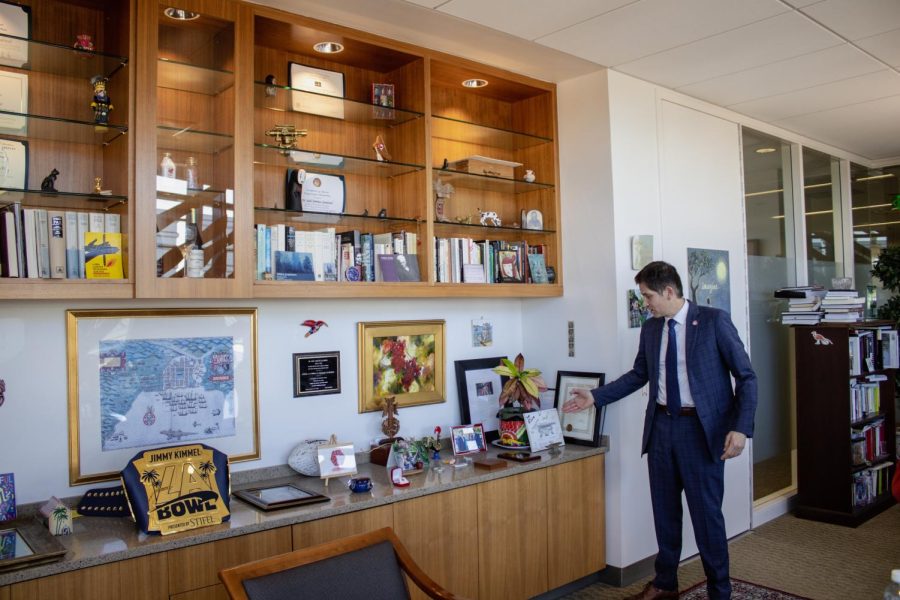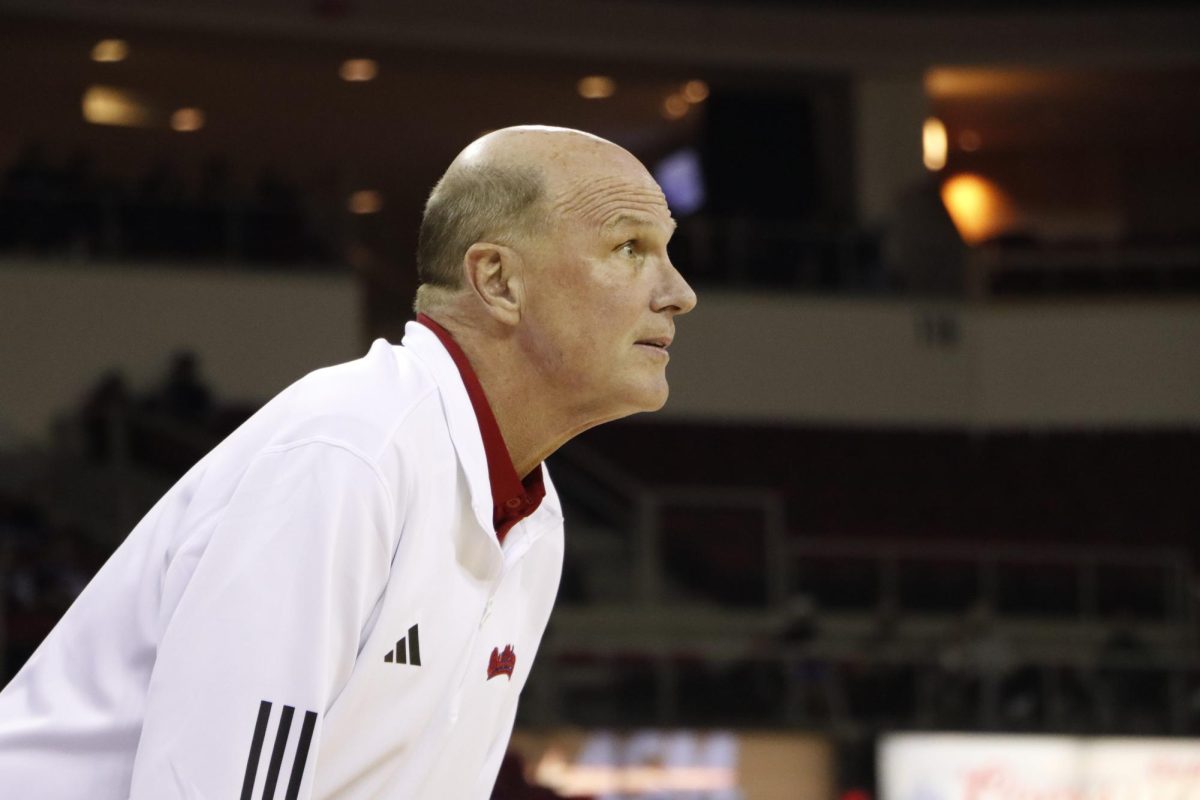From Jalpa to Fowler: How Jiménez-Sandoval became the first Mexican-born president
Carlos Rene Castro/The Collegian
President Saúl Jiménez-Sandoval debuts his new booth located in front of the University Student Union on March 16.
Apr 11, 2023
On the fourth floor of the Library, the Office of the President looms over the center of Fresno State’s campus. From atop the building, his office gives view to the land as it meets the Sierra Nevada mountains.
Inside, mementos line the walls and shelves of the room. Pictures of family members, a painting by a local artist, a piano and even the LA Bowl championship belt make up just some of the president’s many items collected over the years. However, the neatly organized office is a far cry from the small Mexican village in which he grew up in.
In an interview with The Collegian, Saúl Jiménez-Sandoval chronicled his journey from being an immigrant to becoming the first immigrant president of Fresno State.
Born in 1970 in the mountainous state of Zacatecas, Mexico, Jiménez-Sandoval grew up in a small town called Jalpa, where he spent his childhood surrounded by nature. He lived in a house built in the 1700s that faced a nearby mountain. He recalled the cold mornings where the mountain was enveloped in a fog that would block the sun until midday.
Along with his brother, they explored the nearby mountains, plants and birds.
“It was like a symbiotic relationship in our lives, like it was an intimate relation with nature. We knew the birds and the plants. The knowledge of plants is a significant aspect of the culture where I’m from,” he said.
The culture of the community was an important building block in his life. It prioritized communication and mutual respect between parents and their children.
It is this connection with culture that brought Jiménez-Sandoval closer to poetry. Initially, his passion was in biology, then history and then in the Spanish language. From there, he delved into Renaissance, medieval and colonial literature.
“It was with a journey within myself that led me face-to-face with poetry, and I told myself that I was at home,” he said.
He noted, however, that growing up in the ‘70s, the influence of the United States was felt strongly in his community.
“The culture and the traditions were deeply ingrained [in the community], but at the same time, they saw the economic potential that the United States represented, one that had not yet manifested itself within the country,” he said.
In 1980, Jiménez-Sandoval and his family immigrated to the U.S., narrowly avoiding the financial trouble that came with the devaluation of the Mexican peso in 1982.
“I grew up with everything. At that point, my parents were (financially) stable and then my father specifically moved us in 1980. He had a great vision because after ‘81 the peso was devalued heavily. After that, people suffered very much within the country, and it was then when there was a tremendous exodus [to the U.S.],” he said.
It was in the U.S. where Jiménez-Sandoval began to understand the value of hard work.
“When we came here, my father had a tomato ranch. I had to wake up at 4 or 4:30 in the morning to work on the weekends. That’s when I realized I had a privileged life [in Mexico] because I could tell my brother, ‘Let’s go scale a mountain,’ and we didn’t have anything to do but have fun,” he said.
Regardless, Jiménez-Sandoval fondly remembers his time living in the small town of Fowler. Riding bicycles around town with his brother, he would run errands for his mother. In a small town like Fowler, everyone knew each other and though an influx of new people would come to join the town, he appreciated the supportive environment he found in the community.
The American and Mexican cultures and the differences between them shaped Jiménez-Sandoval’s ambition. By the time he had emigrated from Mexico, he was in the fourth grade and was one of three students in his class who didn’t know English.
By 1982, after the devaluation of the peso prompted many Mexicans to immigrate to the U.S., the number of Mexican students rose, causing a rise of anti-immigrant, specifically, anti-Mexican sentiments that profoundly affected Jiménez-Sandoval.
“It caused me to have a wish of showing and demonstrating to those who discriminated against me that I could be strong. More than that, it gave me the drive to obtain my baccalaureate so that I could go back to Fowler and tell my parents, ‘Here is the diploma you helped me obtain,’” he said. “But I also got it so I could tell the world that I could do it because a lot of people told me I couldn’t. It was a challenge I put forth for myself to demonstrate to the people who doubted me. After I got my master’s because I wanted to know more, I dedicated my doctorate to the people in the district of Fowler who helped me reach my goals.”
For him, his pursuit of a higher education was a full-circle moment. He had faced discrimination when he arrived because of his nationality and language and struggled within himself to show his roots in the United States. It is through his education, Jiménez-Sandoval explained, that he was able to ground himself and make his own roots in this land.
When he arrived at Fresno State, he had only one goal in mind: to be the best Spanish and Portuguese professor there was.
However, he saw that his students would come to classes timid and unsure of themselves. Through his instruction, he saw his students flourish when interacting with the literature, culture and language.
Eventually, Jiménez-Sandoval was elected to be the chair of his department. There, he realized the potential he had to unify Spanish with other languages like French, Italian and Portuguese. Before he knew it, he was dean of Arts and Humanities.
“That’s when I told myself that I loved the classroom. Even today, every two to three months, I dream that I am in the classroom, discussing with my students, pondering over profound questions. Taking that step from professor to dean, it was like uprooting a plant and burying it again. It hurt me, but I knew that by doing so I would impact more students,” he said.
He then attained the position of provost and vice president. His goal to be the best remained, regardless of the position.
Yet, at no point during his rise did he ever set his sights on becoming president. To him, he was just trying to do his job as best as he could. Nevertheless, Jiménez-Sandoval became president and his goal is still the same as it was when he first came to Fresno State.
Now as president, he recognizes that life comes and goes quickly. He explained that he tries to take advantage of his position to benefit the students and community as much as possible. He emphasized the importance of serving the community, believing that empowering students made the community as a whole better.
“I remember a student wrote to me years after graduating around 2003. She told me that she was now a counselor for a school in San Diego. That’s when I saw that what I taught didn’t stay inside the class; it transcended the four walls of the classroom. Students went on to become leaders within the community,” he said.
This belief in serving the community is ultimately what inspires Jiménez-Sandoval to remain in the Central Valley.
When asked where he sees himself in 20 years, he sees himself in the Valley, where his friends still reside. When he retires, he plans on staying in the region, where he has a deep-rooted connection.
The connection he has made to the region and to the people he has met is part of Jiménez-Sandoval’s story. His desire to grow as an educator to uplift students is how he helps others in their stories to seize opportunities and help the community.
“I want students to know that the most important foundation of anyone is their story. We perceive this story as a debilitating force, but when it is confronted and all of the processes from the past, from their parents and their grandparents, mix inside people today. It is what makes this debilitating force into a person’s greatest strength.”









